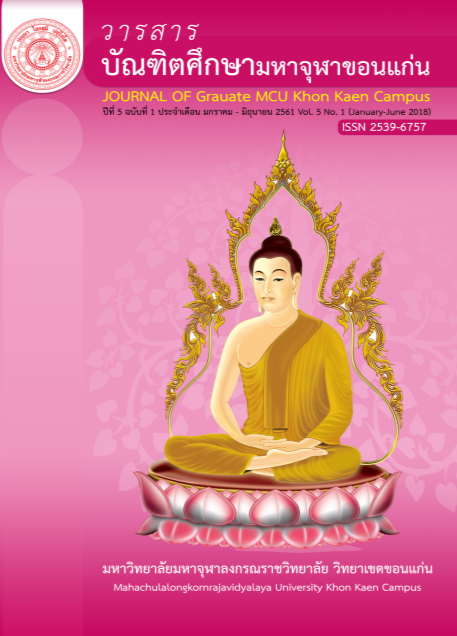กรอบแนวคิดการสังเคราะห์ตัวแบบยุทธศาสตร์เพื่อยกระดับการเป็นเมืองน่าอยู่ขององค์กรปกครองส่วนท้องถิ่น
Main Article Content
Abstract
บทความนี้มีวัตถุประสงค์ที่จะนำเสนอกรอบแนวคิดการสังเคราะห์ตัวแบบยุทธศาสตร์เพื่อยกระดับการเป็นเมืองน่าอยู่ให้กับองค์กรปกครองส่วนท้องถิ่น ซึ่งเป็นองค์กรหลักที่เป็นฐานทรัพยากรหลักให้กับสังคมไทย และเป็นจุดเริ่มต้นที่สำคัญอันจะนำไปสู่ฐานการพัฒนาอย่างยั่งยืนของสังคมในองค์รวม กรอบแนวคิดที่นำเสนอนี้มีเป้าหมายเพื่อเติมเต็มทางความคิด ทั้งทางรูปธรรมและนามธรรมเพื่อสร้างฐานปัญญา และยกระดับการขับเคลื่อนองค์กรปกครองส่วนท้องถิ่น แกนนำ และประชาชนในพื้นที่ ตลอดจนองค์กรเครือข่ายที่เกี่ยวข้องกับการพัฒนาในพื้นที่ได้เป็นองค์กรปกครองส่วนท้องถิ่นที่เป็นองค์กรแห่งการเรียนรู้ และเปลี่ยนแปลงการขับเคลื่อนสู่ “เมืองน่าอยู่ – Livable City” โดยอยู่บนพื้นฐานการนำเอาหลักการทางทฤษฎี และสมมติฐานการพัฒนาอย่างยั่งยืนในบริบทท้องถิ่น สากล ยึดโยงกับแนวทาง การพัฒนาอย่างยั่งยืนของสังคมไทยคือ ปรัชญาเศรษฐกิจพอเพียง ประกอบด้วย 4 แนวทางหลักคือ 1) การค้นหาประเด็นการพัฒนาการบริหารจัดการสิ่งแวดล้อมของพื้นที่กับความสอดคล้องแนวคิดการส่งเสริมเมืองน่าอยู่ 2) การนำแนวคิดการพัฒนาอย่างยั่งยืนด้านสิ่งแวดล้อมเมืองน่าอยู่บนฐานคิดปรัชญาเศรษฐกิจพอเพียงกับแนวทางการนำไปใช้เป็นเครื่องมือในการยึดโยงค่านิยม วัฒนธรรม ภูมิปัญญาท้องถิ่นเข้าด้วยกัน 3) การวิเคราะห์แนวทางการปฏิบัติที่เป็นเลิศที่ตั้งอยู่บนพื้นฐานของความเป็นจริงและอยู่บนหลักเหตุผลที่ผ่านมา 4) การบูรณาการข้อมูลการศึกษาวิจัยทั้งหมดมาเป็นตัวแบบทางความคิด และการบริหารจัดการเชิงประจักษ์
This article is intended to present analysis strategic model framework to enhance local administration as livable city. This administration is main resource bade for Thai society and important beginning that lead to holistic social sustainable development. The purpose of this framework is to fulfill concrete and abstract thought including to set up knowledge base and also to enhance moving of local administration, mainstay, local citizen and network that concern with development in the area being as learning organization and change to livable city. It bases on theory, local and international sustainable development hypothesis involving with sufficiency economy. It consists of 1) finding out development administration issue in local environment management conform to livable city concept 2) applying environmental sustainable development livable city which base on sufficiency economy and applying as instrument with values, custom and local wisdom 3) Analyzing best practice based on reality and previous reason 4) integration data of all research as thinking model and empirical management.
Article Details
References
http://www.millenniumassessment.org/ en/About.htm . Retrieved January 9, 2018. Ministry of the Environment. (2007). Building a low carbon society. Online. from: https://www.env.go.jp/earth/info/pc071211/en.pdf. Retrieved February 21, 2017. Murota, M. (2014). Role of community-based approaches with administrative support in an urban low-carbon society in the UK. Journal of Asian Architecture and Building Engineering, 13 (3), 593-600. The United Nations Conference for Environment and Development-UNCED. (1992). Online. from:http://www.unep.org/unep/sub1.htm. Retrieved February 21, 2017. The World Commission on Environment and Development (WCED). (1987). Brundtland Report. United : Nations. United Nations. Earth Summit. (1992). Convention on Biological Diversity. United Nations Conference on Environment and Development.Rio de Janero : Brazil. United Nations Division for Sustainable Development. (2013). Agenda 21:Earth Summit: The United Nations Programme of Action from Rio. Online. From : https://sustainabledevelopment.un.org/content/ documents/Agenda21.pdf. Retrieved November 9, 2017. United Nations Framework Convention on Climate Change. (2014). Kyoto Protocol. Online. from: http://unfccc.int/kyoto_protocol/items /2830.php. Retrieved November 9, 2017. WHO Regional Office for Europe. (2014). Athens Declaration for Healthy Cities: International Political Statement and WHO European Healthy Cities Network and Network of National Networks Phase VI Action Commitments. WHO Regional Office for Europe : Copenhagen. World Commission on Environment and Development. (1987). Our Common Future. New York : Oxford University Press.
Yoktep, S. and Yupas, Y. (2016). The People’s Participation on the Development Plan Making of Bandue Municipality, Muang Nong khai, Nongkhai Province. Journal of MCU Peace Studies, 5 (Special1), 182-191.

